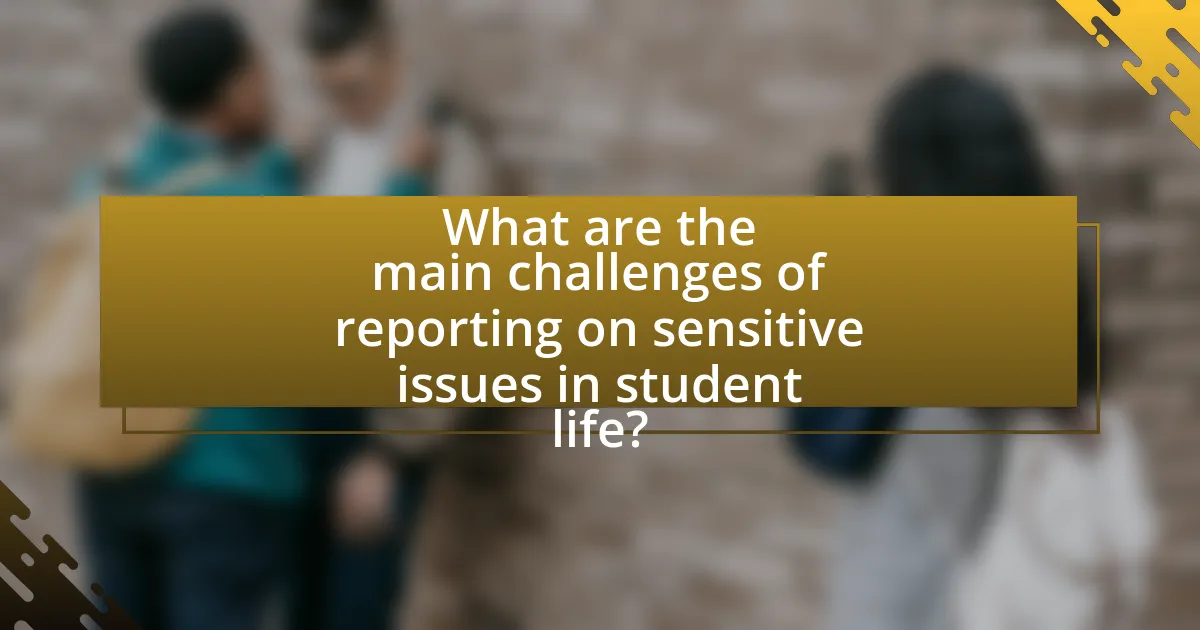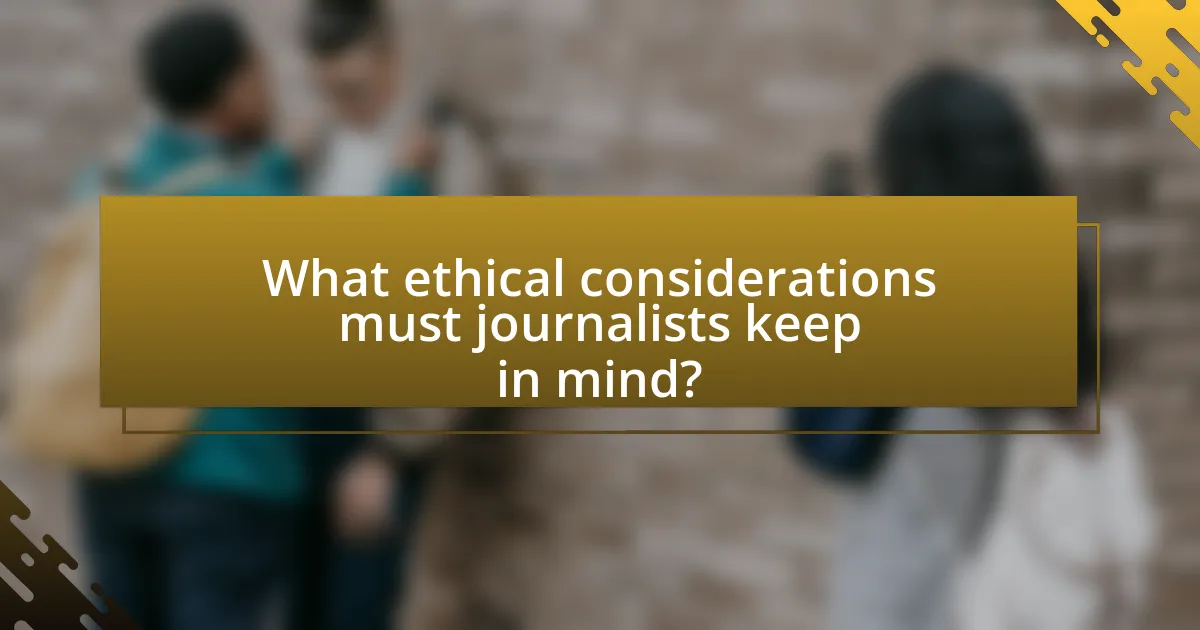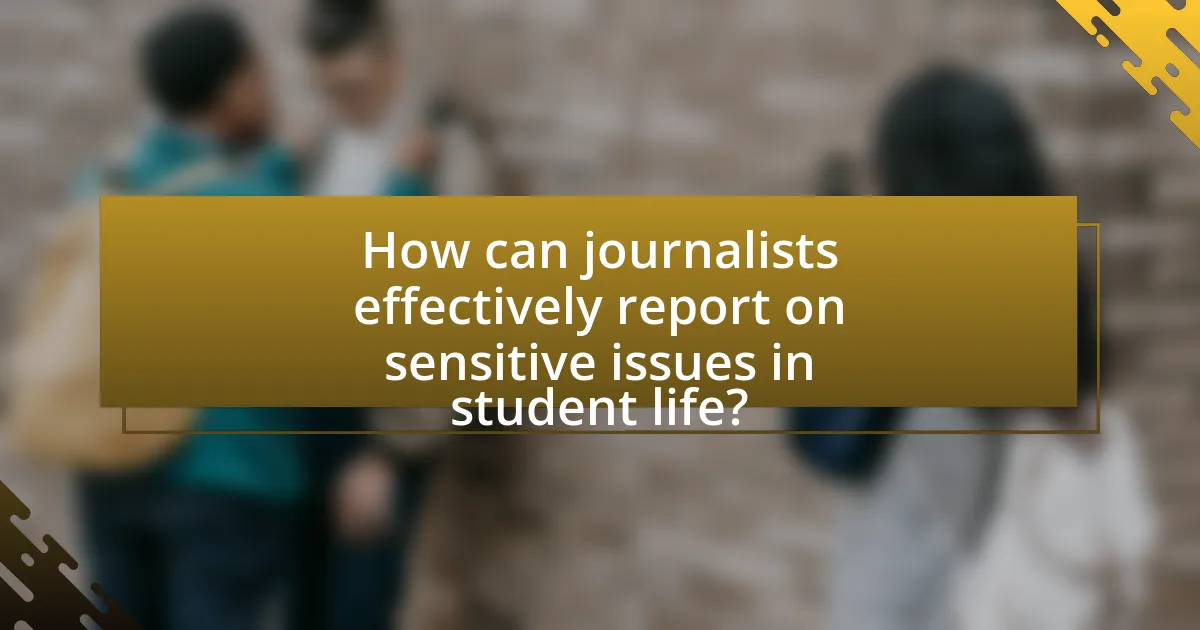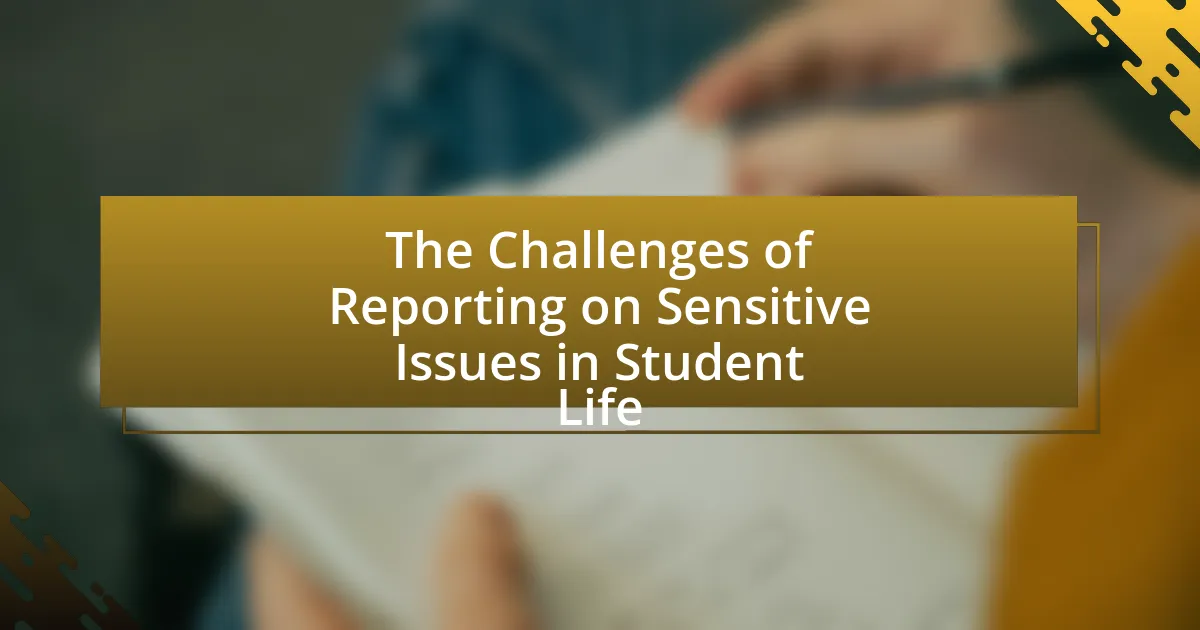The article examines the challenges of reporting on sensitive issues in student life, highlighting concerns related to privacy, community backlash, and the emotional impact on students. It emphasizes the importance of sensitivity in journalism, particularly when addressing topics such as mental health, sexual harassment, and discrimination, as insensitivity can exacerbate stigma and harm student well-being. The article also discusses the ethical considerations journalists must navigate, including confidentiality, bias, and the influence of institutional pressures, while providing best practices for responsible reporting that prioritizes the dignity and experiences of students.

What are the main challenges of reporting on sensitive issues in student life?
The main challenges of reporting on sensitive issues in student life include concerns about privacy, potential backlash from the community, and the emotional impact on students involved. Privacy concerns arise when reporting on topics such as mental health, sexual assault, or discrimination, as students may fear exposure or stigma. Backlash can occur from peers, parents, or institutions that may not support open discussions about these issues, leading to a chilling effect on reporting. Additionally, the emotional impact on students can complicate the reporting process, as journalists must navigate the delicate balance between raising awareness and respecting individuals’ feelings and experiences. These challenges are underscored by the need for ethical journalism that prioritizes the well-being of students while striving to inform the public.
Why is sensitivity important when reporting on student issues?
Sensitivity is important when reporting on student issues because it ensures the emotional and psychological well-being of students is prioritized. Reporting on sensitive topics, such as mental health, bullying, or personal crises, requires an understanding of the potential impact on students’ lives. For instance, research by the American Psychological Association indicates that insensitive reporting can exacerbate feelings of isolation and distress among affected students. Therefore, employing sensitivity in reporting fosters a supportive environment, encourages open dialogue, and promotes healing, ultimately contributing to a healthier school community.
What are the potential consequences of insensitivity in reporting?
Insensitivity in reporting can lead to significant harm, including the perpetuation of stigma and trauma among affected individuals. When sensitive issues are reported insensitively, it can alienate communities, discourage individuals from seeking help, and contribute to misinformation. For instance, studies have shown that insensitive media portrayals of mental health issues can exacerbate feelings of isolation among students, leading to increased rates of anxiety and depression. Furthermore, insensitivity can damage the credibility of the reporting outlet, resulting in a loss of trust from the audience and potential backlash from advocacy groups.
How can insensitivity affect student well-being?
Insensitivity can significantly harm student well-being by fostering an environment of emotional distress and alienation. When students experience insensitivity from peers or educators, it can lead to increased anxiety, depression, and a sense of isolation. Research indicates that students who face bullying or insensitivity are more likely to report lower self-esteem and higher levels of psychological distress, as highlighted in a study published in the Journal of School Psychology, which found that 20% of students reported feeling unsafe due to insensitivity in their school environment. This emotional turmoil can hinder academic performance and overall life satisfaction, demonstrating the critical need for sensitivity in educational settings.
What types of sensitive issues are commonly reported in student life?
Sensitive issues commonly reported in student life include mental health challenges, sexual harassment, substance abuse, academic pressure, and financial difficulties. Research indicates that approximately 30% of college students experience significant anxiety, while 20% report depression, highlighting the prevalence of mental health concerns. Additionally, the Association of American Universities found that 13% of students experienced sexual assault during their college years, underscoring the seriousness of harassment issues. Substance abuse is also a critical concern, with studies showing that nearly 40% of college students engage in binge drinking. Academic pressure often leads to stress and burnout, affecting students’ overall well-being. Lastly, financial difficulties are reported by 70% of students, impacting their ability to focus on studies and succeed academically.
How do mental health issues impact reporting?
Mental health issues significantly impact reporting by influencing the accuracy and sensitivity of the information conveyed. Journalists may face challenges in obtaining reliable accounts from individuals experiencing mental health struggles, as these individuals might be reluctant to share their experiences due to stigma or fear of misrepresentation. Research indicates that 61% of individuals with mental health conditions report feeling misunderstood by the media, which can lead to underreporting or sensationalism of mental health topics. Furthermore, the emotional state of reporters themselves can affect their objectivity and the framing of stories, potentially leading to biased narratives.
What role do incidents of discrimination play in sensitive reporting?
Incidents of discrimination significantly impact sensitive reporting by influencing the framing and tone of narratives. Such incidents can lead to heightened emotional responses from both reporters and audiences, necessitating careful consideration of language and context to avoid perpetuating harm or bias. For instance, research indicates that media coverage of discrimination often shapes public perception and can either reinforce stereotypes or promote understanding, depending on how the incidents are reported. Accurate representation of discrimination incidents is crucial, as it affects the credibility of the reporting and the trust of the affected communities.
How do cultural differences influence reporting on sensitive issues?
Cultural differences significantly influence reporting on sensitive issues by shaping journalists’ perspectives, language choices, and ethical considerations. For instance, in collectivist cultures, reporters may prioritize community harmony and avoid sensationalism, leading to more cautious coverage of topics like mental health or sexual assault. Conversely, in individualistic cultures, there may be a greater emphasis on personal narratives and freedom of expression, resulting in more open discussions about such issues. Research by the Pew Research Center indicates that cultural context affects how media outlets frame stories, impacting public perception and discourse surrounding sensitive topics.
What are the challenges of representing diverse student backgrounds?
Representing diverse student backgrounds presents challenges such as ensuring accurate representation, addressing stereotypes, and navigating cultural sensitivities. Accurate representation is crucial because misrepresentation can lead to a lack of trust and engagement among students. For instance, studies show that when media portrayals do not reflect the true diversity of student populations, it can alienate underrepresented groups, impacting their sense of belonging. Additionally, addressing stereotypes is essential, as they can perpetuate biases and hinder the understanding of individual student experiences. Cultural sensitivities further complicate representation, as educators and institutions must be aware of and respect the varied cultural contexts that influence students’ identities. These challenges highlight the need for intentional and informed approaches to accurately represent the diverse backgrounds of students in educational settings.
How can cultural sensitivity improve reporting practices?
Cultural sensitivity can improve reporting practices by fostering a more accurate and respectful representation of diverse communities. When reporters understand and acknowledge cultural differences, they can avoid stereotypes and biases that may distort the narrative. For instance, research by the American Press Institute indicates that culturally sensitive reporting leads to increased trust and engagement from marginalized groups, enhancing the overall quality of journalism. By incorporating diverse perspectives and ensuring that all voices are heard, reporting becomes more comprehensive and reflective of the community it serves.

What ethical considerations must journalists keep in mind?
Journalists must keep in mind the ethical considerations of accuracy, fairness, and sensitivity when reporting on sensitive issues in student life. Accuracy ensures that information is fact-checked and reliable, which is crucial in maintaining credibility and trust with the audience. Fairness involves presenting multiple perspectives and avoiding bias, particularly when covering topics that may affect vulnerable populations, such as students. Sensitivity is essential in handling personal stories or traumatic events, requiring journalists to respect privacy and avoid causing further harm. These ethical principles are supported by the Society of Professional Journalists’ Code of Ethics, which emphasizes the importance of minimizing harm and acting independently.
How do confidentiality and privacy affect reporting on sensitive issues?
Confidentiality and privacy significantly impact reporting on sensitive issues by limiting the information that can be disclosed and shaping the ethical considerations of journalists. When reporters handle sensitive topics, such as mental health or sexual assault, they must prioritize the protection of individuals’ identities and personal information to maintain trust and comply with legal standards. For instance, the Society of Professional Journalists emphasizes the importance of minimizing harm, which includes respecting the privacy of sources and subjects involved in sensitive stories. This ethical obligation can lead to challenges in obtaining comprehensive information, as sources may be reluctant to share details if they fear exposure or repercussions. Additionally, legal frameworks, such as the Health Insurance Portability and Accountability Act (HIPAA) in the United States, impose strict regulations on the sharing of personal health information, further complicating the reporting process. Thus, confidentiality and privacy not only guide ethical journalism practices but also directly influence the depth and accuracy of reporting on sensitive issues.
What guidelines should journalists follow to protect student identities?
Journalists should prioritize confidentiality and anonymity to protect student identities. This includes obtaining informed consent before publishing any identifiable information, ensuring that students are aware of how their information will be used. Additionally, journalists should avoid using names, images, or other identifying details unless absolutely necessary and should consider using pseudonyms or general descriptors to maintain privacy. The Society of Professional Journalists emphasizes the importance of minimizing harm, which is particularly crucial when reporting on sensitive issues involving students. By adhering to these guidelines, journalists can uphold ethical standards while safeguarding the identities of vulnerable individuals.
How can consent be obtained ethically in sensitive reporting?
Consent can be obtained ethically in sensitive reporting by ensuring that individuals are fully informed about the nature of the reporting and the potential implications of their participation. This involves providing clear, comprehensive information about how their stories will be used, the audience that will see the report, and any risks involved. Ethical guidelines, such as those outlined by the Society of Professional Journalists, emphasize the importance of transparency and respect for the subjects’ autonomy in decision-making. Additionally, obtaining consent should involve a process that allows individuals to ask questions and withdraw their consent at any time, reinforcing their control over their narrative.
What are the implications of bias in reporting sensitive issues?
Bias in reporting sensitive issues can lead to misinformation, stigmatization, and a lack of trust in media sources. When journalists present information with a biased perspective, they may distort facts or omit critical context, which can mislead the audience. For example, biased reporting on mental health issues among students can perpetuate stereotypes and discourage individuals from seeking help, as evidenced by studies showing that negative portrayals can increase stigma (Corrigan, 2004). Furthermore, biased narratives can alienate affected communities, reducing their willingness to engage with media outlets and share their experiences, ultimately hindering constructive dialogue and understanding.
How can journalists identify and mitigate their own biases?
Journalists can identify and mitigate their own biases by engaging in self-reflection and seeking diverse perspectives. Self-reflection involves critically examining personal beliefs and experiences that may influence reporting, while seeking diverse perspectives includes consulting with colleagues and experts from various backgrounds to challenge preconceived notions. Research indicates that journalists who actively seek feedback and engage in discussions about their biases are more likely to produce balanced and fair reporting, as highlighted in studies by the Pew Research Center, which found that diverse newsrooms lead to more comprehensive coverage of issues.
What impact does bias have on public perception of student issues?
Bias significantly distorts public perception of student issues by shaping narratives that may not accurately reflect the realities faced by students. For instance, media coverage often emphasizes negative stereotypes, such as portraying students as irresponsible or entitled, which can lead to a skewed understanding of their challenges, such as mental health struggles or financial hardships. Research from the Pew Research Center indicates that biased reporting can influence public opinion, leading to misconceptions about the prevalence and nature of student issues, ultimately affecting policy decisions and funding allocations for educational institutions.
What role does institutional pressure play in reporting?
Institutional pressure significantly influences reporting by shaping the narratives and information that are disseminated. This pressure often stems from the expectations and norms established by educational institutions, which can lead to self-censorship among reporters. For instance, studies have shown that journalists may avoid covering sensitive issues, such as sexual assault or mental health crises, due to fear of backlash from their institutions or concerns about reputational damage. This phenomenon is supported by research from the Pew Research Center, which indicates that 63% of journalists feel pressure to conform to institutional guidelines when reporting on sensitive topics. Thus, institutional pressure can limit the scope and depth of reporting, ultimately affecting public awareness and discourse on critical issues in student life.
How can journalists navigate conflicts of interest with educational institutions?
Journalists can navigate conflicts of interest with educational institutions by maintaining transparency and establishing clear ethical guidelines. Transparency involves disclosing any relationships or financial ties with the institution that could influence reporting. For instance, the Society of Professional Journalists emphasizes the importance of avoiding conflicts of interest to uphold credibility. Additionally, journalists should adhere to ethical standards set by professional organizations, such as the American Association of University Professors, which advocates for independence in reporting to ensure that the integrity of the information is preserved. By prioritizing these practices, journalists can effectively manage potential conflicts and provide accurate, unbiased coverage of educational issues.
What strategies can be employed to maintain journalistic integrity?
To maintain journalistic integrity, journalists should adhere to strict ethical guidelines, ensure accuracy, and practice transparency. Ethical guidelines, such as those outlined by the Society of Professional Journalists, emphasize the importance of seeking truth and reporting it, minimizing harm, and acting independently. Accuracy can be ensured through fact-checking and corroborating information from multiple reliable sources, which is crucial when reporting on sensitive issues in student life, where misinformation can lead to significant consequences. Transparency involves disclosing conflicts of interest and being open about the sources of information, which builds trust with the audience. These strategies collectively reinforce the credibility of journalism and protect the integrity of the reporting process.

How can journalists effectively report on sensitive issues in student life?
Journalists can effectively report on sensitive issues in student life by employing a compassionate and ethical approach that prioritizes the well-being of the subjects involved. This involves conducting thorough research to understand the context and implications of the issues, ensuring accurate representation of the students’ experiences, and obtaining informed consent when necessary. For instance, the American Press Institute emphasizes the importance of sensitivity training for journalists covering topics like mental health or sexual assault, which can help them navigate these complex narratives responsibly. Additionally, utilizing anonymous sources can protect individuals while still allowing for the reporting of critical issues, as highlighted in the Society of Professional Journalists’ Code of Ethics.
What best practices should be followed when reporting on sensitive topics?
When reporting on sensitive topics, journalists should prioritize accuracy, empathy, and confidentiality. Accuracy ensures that the information presented is factual and well-researched, which is crucial in maintaining credibility. Empathy involves understanding the emotional impact of the topic on individuals and communities, allowing reporters to approach the subject with sensitivity. Confidentiality is vital to protect the identities and privacy of those involved, especially in cases of trauma or personal struggles. For instance, the Society of Professional Journalists emphasizes the importance of minimizing harm and being respectful to sources, particularly when dealing with vulnerable populations. Following these best practices helps create responsible and ethical journalism that respects the dignity of all individuals involved.
How can journalists build trust with student sources?
Journalists can build trust with student sources by establishing open communication and demonstrating reliability. By actively listening to students’ concerns and respecting their confidentiality, journalists create a safe environment for sharing sensitive information. Research indicates that trust is fostered when journalists are transparent about their intentions and the potential impact of the story, which encourages students to engage more openly. Additionally, consistent follow-up and maintaining a professional relationship further solidify trust, as students feel valued and understood in the reporting process.
What techniques can be used to approach sensitive interviews?
To approach sensitive interviews, techniques such as establishing rapport, using open-ended questions, and practicing active listening are essential. Establishing rapport helps create a safe environment, encouraging interviewees to share their experiences. Open-ended questions allow for deeper insights and give interviewees the freedom to express themselves fully. Active listening ensures that the interviewer acknowledges and validates the interviewee’s feelings, which is crucial in sensitive contexts. These techniques are supported by research indicating that a supportive interview atmosphere can lead to more honest and comprehensive responses, particularly in sensitive topics related to student life.
What resources are available for journalists covering sensitive issues?
Journalists covering sensitive issues have access to various resources designed to support ethical reporting and ensure safety. These resources include training programs offered by organizations such as the Dart Center for Journalism and Trauma, which provides guidance on reporting in high-stress situations. Additionally, the International Federation of Journalists offers a code of ethics that emphasizes the importance of sensitivity and respect when dealing with vulnerable subjects. Furthermore, mental health resources, such as counseling services and peer support networks, are available to help journalists cope with the emotional toll of covering sensitive topics. These resources collectively enhance the ability of journalists to report responsibly and compassionately on sensitive issues.
How can training and workshops enhance reporting skills?
Training and workshops enhance reporting skills by providing structured learning environments where participants can develop specific techniques and gain practical experience. These programs often include expert-led sessions that cover essential topics such as ethical reporting, interviewing techniques, and narrative construction, which are crucial for effectively addressing sensitive issues in student life. Research indicates that hands-on practice in workshops leads to improved confidence and competence in reporting, as participants engage in real-world scenarios and receive immediate feedback from instructors. This combination of theoretical knowledge and practical application equips individuals with the necessary tools to navigate the complexities of reporting on sensitive topics, ultimately leading to more accurate and responsible journalism.
What organizations provide support for journalists in sensitive reporting?
Organizations that provide support for journalists in sensitive reporting include the Committee to Protect Journalists (CPJ), the International Federation of Journalists (IFJ), and the Dart Center for Journalism and Trauma. The CPJ offers resources and advocacy for journalists facing threats, while the IFJ focuses on protecting press freedom and providing training for sensitive reporting. The Dart Center specializes in resources for journalists covering trauma and violence, emphasizing ethical reporting practices. These organizations are recognized for their commitment to supporting journalists in navigating the complexities of sensitive topics.
What are the common pitfalls to avoid in sensitive reporting?
Common pitfalls to avoid in sensitive reporting include lack of empathy, failure to verify facts, and inadequate consideration of the impact on individuals involved. Lack of empathy can lead to insensitivity towards the subjects of the report, potentially causing harm or distress. Failure to verify facts can result in the dissemination of misinformation, undermining the credibility of the report. Inadequate consideration of the impact on individuals can lead to ethical breaches, as sensitive issues often involve vulnerable populations. These pitfalls can compromise the integrity of the reporting process and negatively affect the subjects and the audience.
How can journalists recognize and address their own biases?
Journalists can recognize and address their own biases by engaging in self-reflection and seeking feedback from diverse perspectives. Self-reflection involves critically examining personal beliefs and experiences that may influence reporting, while feedback from colleagues or mentors can highlight blind spots. Research indicates that awareness of cognitive biases, such as confirmation bias, can improve journalistic integrity and objectivity. For instance, a study published in the Journal of Media Ethics emphasizes the importance of training programs that focus on bias recognition, which can enhance journalists’ ability to report fairly on sensitive issues.
What steps can be taken to ensure balanced reporting?
To ensure balanced reporting, journalists should implement a multi-faceted approach that includes thorough research, diverse sourcing, and fact-checking. Thorough research involves gathering information from multiple perspectives to provide a comprehensive view of the issue. Diverse sourcing requires including voices from various stakeholders, such as students, faculty, and community members, to reflect the complexity of the topic. Fact-checking is essential to verify the accuracy of information presented, which helps maintain credibility and trustworthiness in reporting. These steps collectively contribute to a more nuanced and fair representation of sensitive issues in student life.

Leave a Reply